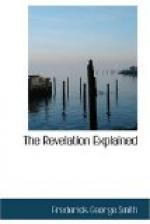“One more trumpet yet to summon
us before the judgment seat,
Then the time of our frail planet will
be said to be complete.
How the wicked will be wailing and the
righteous overjoyed
When with fire the heav’ns are burning
and the earth shall be destroyed!”
This angel “set his right foot upon the sea, and his left foot on the earth,” that his lion-like voice might be heard over all the world. This shows that the earth (the Apocalyptic earth—the territory of the Roman empire) was not the only place where the message was to be borne; it was to be sounded upon the sea, which would indicate its promulgation among all nations.
When his mighty voice sounded, “seven thunders uttered their voices”; and when about to record what they said, John was commanded to “seal up those things which the seven thunders uttered, and write them not.” The fact that they were not to be recorded shows that they were to constitute no part of this Revelation. John evidently thought so at first; for they had the appearance of revelation, something clothed with divine authority, but they were not to be delivered to the church. What, then, were they? The most probable supposition is, that they were things that God for some reason did not choose to have revealed. Their sayings may have described events just prior to the end so perfectly as to leave the world in no doubt respecting the nearness of Christ’s second coming; whereas it appears in the Scriptures that God has designed that it should be a matter of considerable uncertainty, especially to the unsaved. However, we can obtain no satisfactory explanation of the things uttered by the seven thunders; for we can not identify positively what John was commanded to “seal up.”
This angel had in his hand a little book that John was required to take and eat. In advancing and taking the book, John himself becomes an actor in the symbolic scene, the same as was the book and the angel from whose hand he took it. Therefore we must now consider John a symbol of something in this vision. Some of the commentators have supposed that this book signified the remainder of the book of Revelation. But John was commanded to write the Revelations, not to eat them. And if he ate them, how, then, could they constitute the remainder of the book? Its true signification is undoubtedly the word of God. In making such an application we do not necessarily make one book merely a symbol of a larger one, as the Bible is, but of God’s revealed will, just the same as the sealed book of chapter V was the symbol of the divine purposes. When we come to explain the resurrection of the witnesses in chapter XI, it will be found that this is the time when the word of God is again taught in all its purity, being restored for the first time, in its perfect sense, since the morning time of this dispensation. A great spiritual famine has for centuries overspread the earth.




